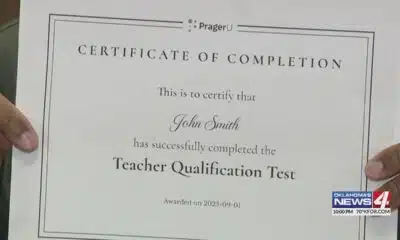News from the South - Louisiana News Feed
Louisiana political campaigns might get to withhold more donation, spending info
by Julie O’Donoghue, Louisiana Illuminator
June 4, 2025
Louisiana lawmakers might diminish information available to the public about political donations and election spending through a sprawling rewrite of the state’s campaign finance law.
Gov. Jeff Landry is pushing House Bill 693, sponsored by House Republican Caucus Chairman Mark Wright, R-Covington. It carves out more circumstances under which political contributions and expenditures don’t have to be disclosed on a public campaign finance report.
The 101-page proposal is difficult to understand for people who don’t deal with campaign finance regulations frequently. Even staff attorneys for the Louisiana Board of Ethics, which enforces the campaign finance laws, admit the changes are confusing.
“To be honest with you, it’s going to take quite a grace period to figure all this out,” Ethics Administrator David Bordelon said when presenting the bill to the state ethics board last month.
GET THE MORNING HEADLINES.
Private attorneys Stephen Gelé and Charles Spies helped write the bill. They have represented Landry in multiple disputes he has had with the ethics board, including over campaign finance laws and enforcement.
Gelé has said the proposal respects constitutional rights, including freedom of speech, while still providing transparency and “preventing the appearance of corruption.”
The state’s preeminent government watchdog group disagrees. The Public Affairs Research Council of Louisiana (PAR) has come out against the legislation, saying the bill would benefit politicians while offering little for the general public.
“There is a very large bill, and I don’t quite understand the problem it is trying to solve,” PAR President Steven Procopio said at a legislative hearing last month.
The Louisiana House voted to approve the legislation on a 77-16 vote last month. The Senate will start taking up the bill Wednesday, and both chambers need to pass it by the end of the legislative session on June 12.
In more than 20 places in the law, the bill increases the minimum dollar threshold at which a donation or expense has to be included on a public campaign finance report.
For example, national political committees that raise most of their money outside Louisiana are required to publicly disclose their spending on a Louisiana election once it reaches $20,000. The proposed bill would hike that disclosure threshold to $50,000.
The current law also requires any campaign contributions or expenditures over $200 given within the 20 days before the election to be reported on a public campaign finance report. The proposed law would hike that disclosure threshold to $5,000.
Louisiana set to spend at least $7 million to bring Saudi-owned LIV Golf to New Orleans
Over a dozen similar changes are also part of the legislation.
Individuals who are not political candidates and groups that are not explicitly political committees could also spend money on an election without disclosing contributions they accepted for the politicking.
Those who are not a candidate or a designated political committee would only be required to disclose election spending over $1,000 in a political cycle and if it involved:
- federally-regulated broadcast media;
- 500 pieces of mail;
- a phone bank of 500 calls within a 30-day period; or
- digital or print advertising with a candidate’s image that’s distributed in the area the candidate would represent within 30 days of their primary and 60 days of their general election
These changes would apply to large, statewide elections and smaller ones such as those for police juries, town councils and school boards.
Money spent to communicate with people in a “membership organization” – such as a union, industry association or an athletic club – as well as employees and stockholders of a business also would not have to be reported as a political expense. This could include communication sent to thousands of people at once.
In some cases, current campaign finance law obliges people to report this type of spending that would be shielded under the Wright bill. But supporters of the legislation said these exceptions were mainly carved out with so-called social welfare organizations, which already aren’t required to disclose their donors, in mind.
The organizations, which critics call “dark money” political groups, are registered with the IRS as 501(c)(4) nonprofits for tax purposes and can keep their contributors private under federal regulations. It’s unclear to what extent the groups have to disclose their spending on Louisiana elections under current state campaign finance laws.
Landry has set up at least one of these “dark money” groups, Protect Louisiana Values, to advance his political agenda. It also notably put up the money for Landry to rent a live tiger to attend an LSU football game last year.
Defying Landry, Louisiana lawmakers reject giving him more control over licensing boards
Former Gov. John Bel Edwards also established two of his own “dark money” groups during his eight years in office: Rebuild Louisiana and A Stronger Louisiana.
While limiting disclosure on political spending, Wright’s legislation does open up allowable uses of politician’s campaign funds to a much wider group of expenses, including their home mortgages, country club fees and gym memberships.
The legislation is also one of a few bills Landry is pushing to soften ethics laws and regulations this session. Lawmakers in favor of them said they are reacting to overzealous enforcement by the ethics board.
In 2007, former Gov. Bobby Jindal and legislators passed dozens of restrictions and public disclosure requirements for elected officials and public employees as part of Jindal’s effort to reach a “gold standard” of ethics for Louisiana that would be a model around the country.
Lawmakers are now saying that effort was overreach that needs to be corrected.
“I haven’t come across an elected official who has enjoyed working through this process and hasn’t questioned what they did back in the Jindal era,” Wright said of ethics and campaign finance regulations.
YOU MAKE OUR WORK POSSIBLE.
Louisiana Illuminator is part of States Newsroom, a nonprofit news network supported by grants and a coalition of donors as a 501c(3) public charity. Louisiana Illuminator maintains editorial independence. Contact Editor Greg LaRose for questions: info@lailluminator.com.
The post Louisiana political campaigns might get to withhold more donation, spending info appeared first on lailluminator.com
Note: The following A.I. based commentary is not part of the original article, reproduced above, but is offered in the hopes that it will promote greater media literacy and critical thinking, by making any potential bias more visible to the reader –Staff Editor.
Political Bias Rating: Center-Left
This article provides a detailed critique of a campaign finance bill supported by Republican Governor Jeff Landry and other GOP leaders, highlighting concerns about reduced transparency and increased opportunities for political spending without public disclosure. The coverage tends to emphasize the potential negative consequences of the bill for public accountability, presenting viewpoints from ethics watchdogs and critics who argue the legislation benefits politicians and “dark money” groups. While it reports statements from bill supporters, the overall framing leans toward skepticism of the Republican-led effort, consistent with a center-left perspective that prioritizes transparency and limiting the influence of money in politics.
News from the South - Louisiana News Feed
Lafayette prosecutor Gary Haynes’ federal bribery trial starts
SUMMARY: Gary Haynes, longtime Lafayette Assistant District Attorney, faces federal trial Monday on bribery, kickback, money laundering, and obstruction charges linked to the 15th Judicial District Attorney’s Office pretrial intervention program. Indicted in September, Haynes allegedly steered participants to a vendor in exchange for bribes, including an $81,000 truck. Co-conspirators, all pleading guilty, are expected to testify against him. Evidence includes wiretaps and consensual recordings. Haynes remains on unpaid administrative leave amid scrutiny for rehiring him after a decade-old bribery scandal shuttered the office. The trial poses significant reputational and legal consequences, with Haynes facing up to 60 years if convicted.
The post Lafayette prosecutor Gary Haynes’ federal bribery trial starts appeared first on thecurrentla.com
News from the South - Louisiana News Feed
NBC 10 News Today: LSU female drum major
SUMMARY: The LSU Golden Band from Tigerland is gearing up for an exciting season, highlighted by senior Catherine Mansfield as only the fourth female drum major in the band’s history. With 325 members, the talented group has spent countless hours perfecting their performance, emphasizing precision, passion, and flawless execution. Mansfield feels the pressure but feeds off fan excitement, while Drum Captain Brayden Ibert praises the youthful, skilled group. Associate Director Simon Holoweiko underscores the dedication behind every drill, footwork, and horn note, ensuring the band delivers a powerful, high-energy show that electrifies game day experiences for LSU fans.
The LSU Tiger Band is gearing up for the 2025 season premiere, marking a historic moment as senior drum major Catherine …
News from the South - Louisiana News Feed
Clay Higgins continues his atypical quest for political relevance
by Greg LaRose, Louisiana Illuminator
September 7, 2025
For at least a moment earlier this year, U.S. Rep. Clay Higgins was willing to depart from his typical far-right, far-fetched stances to take a position most would label liberal – on a criminal justice matter, of all things.
Yet just months later, the Lafayette Republican is back to his extremist ways. What’s different now is that he appears rudderless, permanently veering to the right to the point where it could be argued he’s merely spinning in political circles.
Heads turned during the spring session of the Louisiana Legislature when Higgins, a former policeman, gave his support to a proposal that would have let people put in Louisiana prisons by non-unanimous juries seek reviews of their cases. The lawman-turned-lawmaker urged the “swift passage” of the bill by state Sen. Royce Duplessis, D-New Orleans, arguing it preserved the U.S. Constitution’s rights to due process and a fair trial.
“You could not have told me in my 42 years on this earth that I would have a letter from Congressman Clay Higgins supporting a bill that I brought,” Duplessis told colleagues on the Senate floor before they resoundingly rejected the measure. Opponents in the Republican supermajority said the policy change would overload prosecutors and court staff.
In recent days, Higgins has come out firing on all cylinders but with no clear direction ascertainable.
On Aug. 29, he sent a letter to House Speaker Mike Johnson saying that he was stepping down from the House Homeland Security Committee after Rep. Andrew Garabino, R-N.Y., was named its new chairman. Higgins, a candidate for the post, appeared dejected after the vote.
“My Republican colleagues have chosen an alternate path for the Committee that I helped to build,” he wrote to Johnson, “a path more in alignment with the less conservative factions of our Conference, factions whose core principles are quite variant from my own conservative perspective on key issues like amnesty, ICE operations, and opposition to the surveillance state.”
That’s the Higgins we’ve come to know – bitter, self-righteous and steered by conspiracy theories. As he still sits on the House Armed Services and the Oversight and Government Reform committees (chairing the latter’s law enforcement subcommittee), there will be ample chances for him to make bluster’s last stand.
And by no means will Higgins limit himself to those matters. A week ago, he urged the House Appropriations Subcommittee on Labor, Health and Human Services to withhold federal funding from “organizations that push COVID vaccines on young children.”
It followed his pledge on social media to “defund” the New Orleans Health Department for promoting the American Academy of Pediatrics’ guidance on COVID-19 vaccines for children from 6 months to 2 years old.
“State sponsored weakening of the citizenry, absolute injury to our children and calculated decline of fertility,” Higgins wrote in an Aug. 20 X post.
Call me a skeptic, but if there’s a group out there that’s least likely to be anti-fertility, it’s probably pediatricians. It’s not good for their business model.
YOU MAKE OUR WORK POSSIBLE.
Higgins’ latest play for political relevance came Thursday when he joined forces with Rep. James Comer, R-Ky., Oversight and Government Reform chairman, to investigate allegations that pharmacy chain CVS Health used “confidential patient information” to lobby the Louisiana Legislature.
Caremark, a CVS subsidiary, is the prescription benefit manager for the health insurance plan that covers state employees in Louisiana. Attorney General Liz Murrill is suing the company, saying it used information gained through that contract to send text messages to state employees asking them to oppose proposed legislation. The bill in question would have prohibited prescription benefit managers from co-owning pharmacies. Ultimately, lawmakers opted for a less aggressive, transparency measure with the support of independent pharmacies.
Critics consider the co-ownership arrangement self-serving, as the management entities have a direct say in how their affiliated pharmacies price – and profit from – prescription drugs.
Comer and Higgins have requested CVS Health president and CEO David Joyner provide a slate of records to aid in their investigation.
David Whitrap, who handles external relations for CVS, said in an email the company plans to respond to Comer and Higgins. With regards to the text messages, its communication with customers, patients and the community “was consistent with the law,” he said.
As much as he wants to position himself to the far right, Higgins’ involvement in accountability efforts such as this makes him a centrist – at least on this issue. The battle against pharmacy benefit managers is a bipartisan one, with both sides looking to claim the win for bringing down prescription drug and health insurance costs.
Regardless, it’s a welcome moment of lucidity from Higgins, much like Rep. Marjorie Taylor Greene’s demand for the U.S. Department of Justice to produce all its files on Jeffrey Epstein.
No one expects it, but it’s certainly welcomed.
For Higgins, more frequent stances like this could help him emerge from the shadow of Louisiana’s more prominent Republicans in the House – Speaker Johnson, Majority Leader Steve Scalise and Rep. Julia Letlow, a member of the powerful House Appropriations Committee.
But if history portends what lies ahead from Higgins, expect him to once again find his comfort zone on the fringes.
Louisiana Illuminator is part of States Newsroom, a nonprofit news network supported by grants and a coalition of donors as a 501c(3) public charity. Louisiana Illuminator maintains editorial independence. Contact Editor Greg LaRose for questions: info@lailluminator.com.
The post Clay Higgins continues his atypical quest for political relevance appeared first on lailluminator.com
Note: The following A.I. based commentary is not part of the original article, reproduced above, but is offered in the hopes that it will promote greater media literacy and critical thinking, by making any potential bias more visible to the reader –Staff Editor.
Political Bias Rating: Center-Left
The content critiques U.S. Rep. Clay Higgins from a perspective that highlights his far-right positions and labels some of his views as extremist, while also acknowledging occasional bipartisan or centrist actions. The tone is skeptical of conservative stances, particularly on issues like criminal justice, immigration, and COVID-19 vaccines, and it uses language that suggests disapproval of right-wing conspiracy theories. However, it also recognizes moments when Higgins aligns with more moderate or bipartisan efforts, indicating a nuanced but generally center-left leaning viewpoint.
-
Mississippi Today6 days ago
Trump proposed getting rid of FEMA, but his review council seems focused on reforming the agency
-
News from the South - Tennessee News Feed6 days ago
Tennessee ranks near the top for ICE arrests
-
News from the South - Missouri News Feed7 days ago
Missouri joins dozens of states in eliminating ‘luxury’ tax on diapers, period products
-
News from the South - Texas News Feed3 days ago
Texas high school football scores for Thursday, Sept. 4
-
News from the South - Arkansas News Feed6 days ago
Every fall there’s a government shutdown warning. This time it could happen.
-
Mississippi News Video7 days ago
WTOK Weather – Zack Rogers 8/30/25
-
Mississippi Today5 days ago
Brandon residents want answers, guarantees about data center
-
News from the South - Oklahoma News Feed6 days ago
Test taker finds it's impossible to fail 'woke' teacher assessment









































